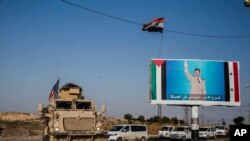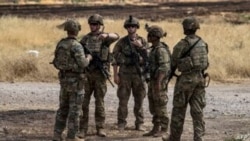A U.S. military patrol returned fire at a checkpoint manned by pro-Syrian regime forces in northeast Syria, reportedly killing one soldier and wounding two others.
“Coalition and Syrian Democratic Forces (SDF), conducting a routine anti-ISIS security patrol near Tal Al-Zahab, Syria, encountered a checkpoint occupied by pro-Syrian regime forces,” the U.S.-led international coalition against the Islamic State (IS) terror group said in a statement Monday.
“After receiving safe passage from the pro-regime forces, the patrol came under small-arms fire from individuals in the vicinity of the checkpoint,” the statement said, adding that “coalition troops returned fire in self-defense.”
🔴On 8/17, @CJTFOIR & @cmoc_sdf, conducting a routine anti-ISIS security patrol near Tal Al-Zahab, encountered a checkpoint occupied by pro-Syrian regime forces...the patrol [was attacked]. Coalition troops returned fire in self-defense. No Coalition casualties. Full Statement 👇🏽 pic.twitter.com/3qWFrZh1wR
— OIR Spokesman Col. Myles B. Caggins III (@OIRSpox) August 17, 2020
One Syrian soldier was killed and two others were wounded in the incident, according to the Syrian state news agency, SANA.
SANA alleged that U.S. warplanes carried out an airstrike on the checkpoint, but the coalition affirmed that it “did not conduct any airstrike.” The coalition also said no casualties occurred on its side.
Regular patrol
A coalition military official told VOA that Monday’s patrol was a regularly scheduled mission in the area “to ensure freedom of movement and verify the location of [Syrian regime] checkpoints in eastern Syria.”
Tal al-Zahab is located near the city of Qamishli in northeast Syria. Qamishli is largely under the control of the Kurdish-led SDF, a major U.S. partner in the fight against IS. Syrian regime troops, however, maintain some presence in the area.
The military official said, “Coalition patrol leaders and [the Syrian regime] checkpoint officer met face-to-face to deconflict movement on the spot,” adding that “the interaction was professional.”
It was only after the passage of the U.S. patrol that Syrian regime forces opened fire at the American side, the official said, which trigged an immediate response.
Previous incident
In February, a U.S. military convoy was attacked by pro-Syrian regime militia fighters near Qamishli.
U.S. forces were in control of most of northeast Syria until October 2019, when the Turkish military and its allied Syrian militias launched a campaign against the U.S.-backed SDF.
Since then, Russian forces and the Syrian government have entered parts of the border region between Turkey and northeast Syria with the aim of filling the area evacuated by U.S. forces.
Oil deal reaction
The U.S. still has about 700 troops in the area who, according to U.S. officials, are protecting the region’s oil fields and preventing IS from reemerging.
Last month, U.S. officials said an American firm has reached a deal with Kurdish-led authorities in northeast Syria to develop and export crude oil in areas under their control.
The Syrian government has condemned the move, describing it as stealing Syria’s oil.
Some experts believe Monday’s incident and other recent provocations by forces loyal to Syrian President Bashar al-Assad highlight a growing hostility toward U.S. actions in Syria.
“The regime wants to express its disapproval of the oil deal by destabilizing the areas where the U.S. has military presence,” said Sadradeen Kinno, a Syrian researcher who follows developments in the country’s northeast.
Last week, the SDF issued a statement in which it accused the Syrian government and other forces of creating chaos in the eastern province of Deir el-Zour. The accusation came after recent assassinations of powerful Arab tribal leaders in Deir el-Zour.
“We could see more of these provocations by the Assad forces, but they cannot escalate further because the regime fears a direct confrontation with U.S. troops,” Kinno told VOA.
National Security Correspondent Jeff Seldin contributed to this article.





